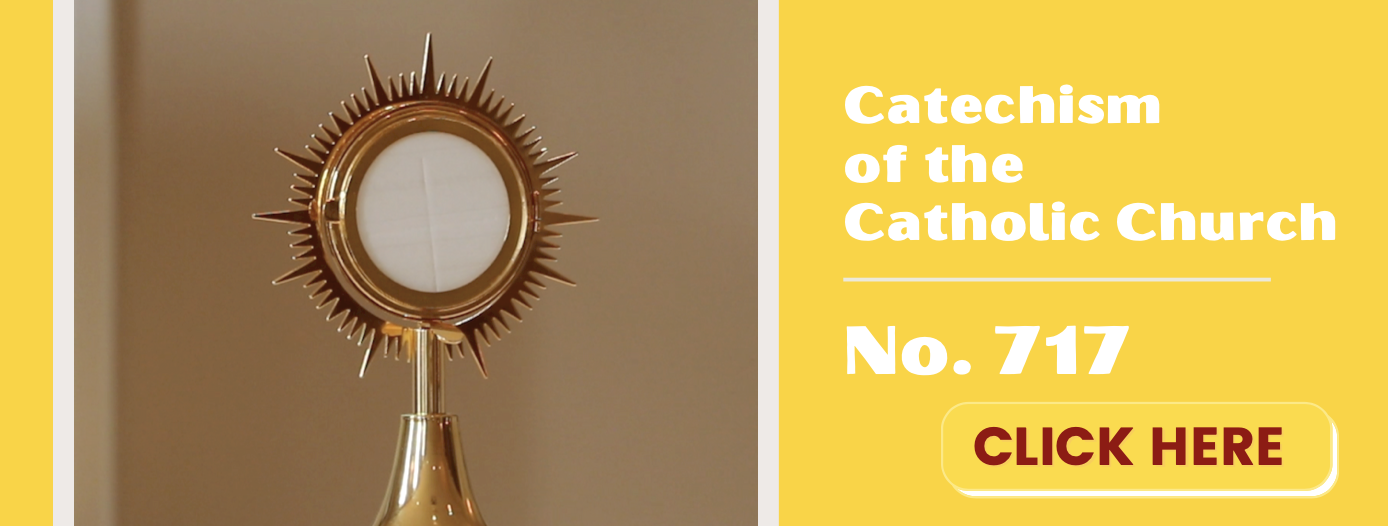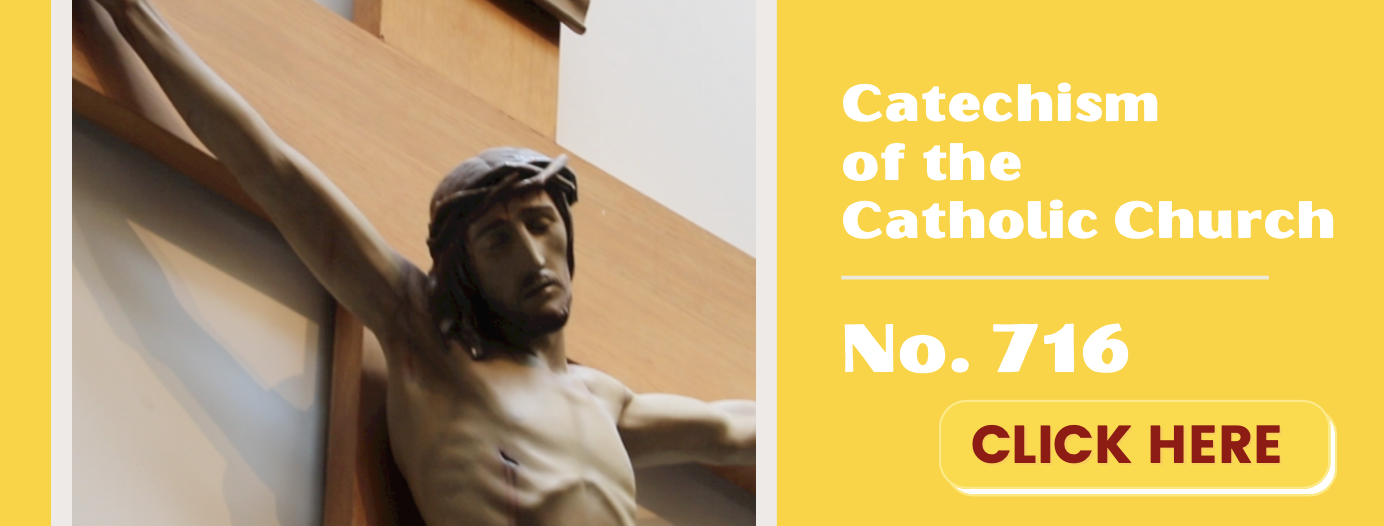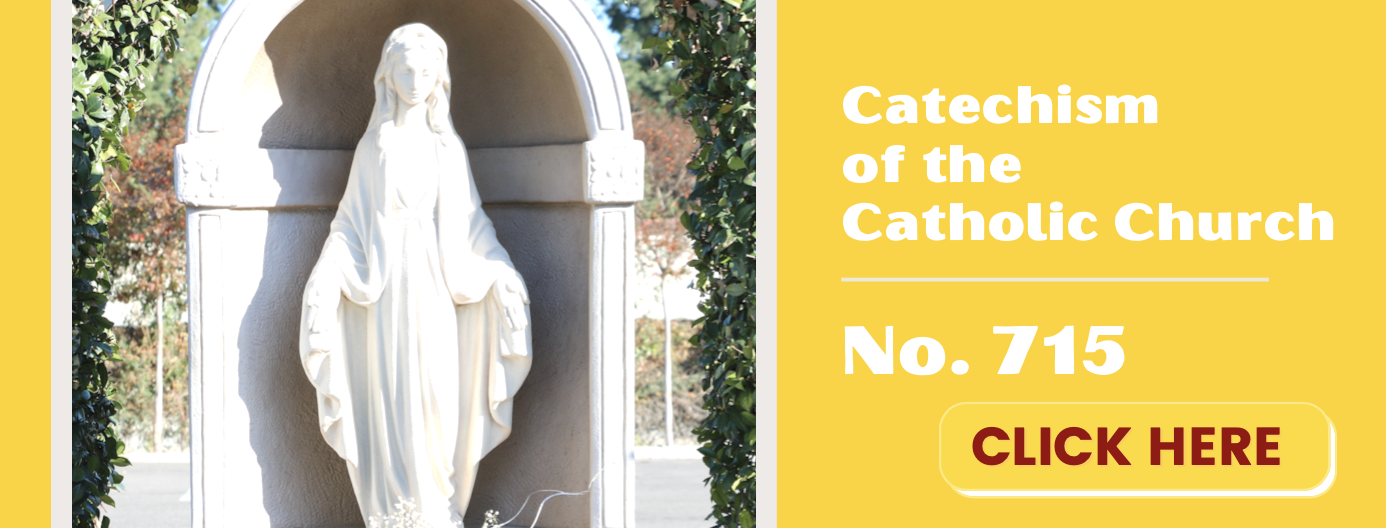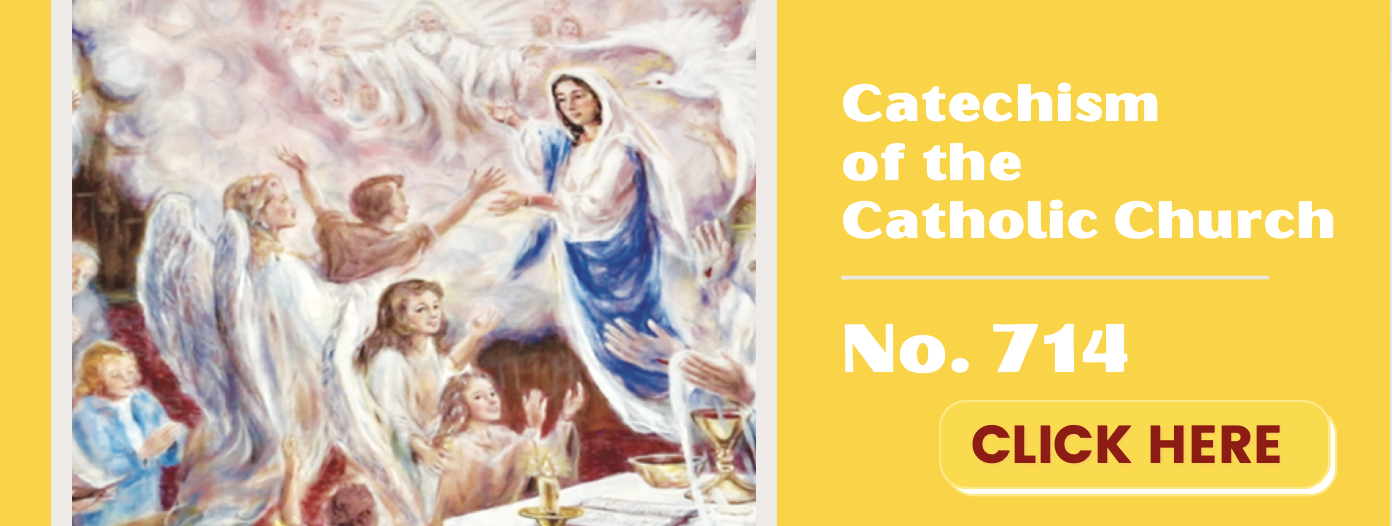Friday of the Fifth Week of Easter



“For greater things you were born.” (Ven. Mother Luisita)
FRIDAY, May 20th Jn 15: 12-17 Jesus said: This is my commandment: love one another as I love you.”
Today we are reminded of the approaching Solemnity of Pentecost! In order for us to love one another as Jesus commands in today’s Gospel, we need the Holy Spirit. The Father loves the Son, and the Son loves the Father. The Holy Spirit is the uncreated love between the Father and the Son.
GOD’S SEVEN GIFTS TO THE SOUL By Fr. Ed Broom, OMV
One of the best analogies given in years past describing the Presence, Power and Perfection of the Holy Spirit is a SAILBOAT. This was before electricity, motor-driven vehicles, or the electronic world. The sailboat is an analogy used in the Middle Ages or earlier.
THE SAILBOAT AND OTHER MEANS OF WATER-TRANSPORTATION. Imagine that you wanted to cross a lake and the distance was five miles. Ruminating upon the various options, these surfaced in your mind. Swimming? You would have to be in top shape, with great stamina, knowing how to swim against the current. A canoe? Maybe more likely than swimming! A rowboat with two rowing? More manpower and direction. Finally, the following occurs to you. A massive Sailboat with an excellent captain and crew, but most important: seven strong, robust sails. Bingo! Of all the options, the sailboat wins the prize. However, the key to maneuvering the massive ship to shore would be detecting and discerning where and when the wind was blowing. Then the Captain would have to raise the sails to catch the wind, of course with the strength and ability of the crew men.
SPIRITUAL INTERPRETATION OF THE ANALOGY OF THE SAILBOAT.
The Fathers of the Church offer us a symbolic interpretation of the Sailboat and Sails related to the working of the Holy Spirit and His Seven Gifts. Here we go! The Sailboat is our soul. The shore is eternal life to which we all aspire and yearn! The uncertain and sometimes rough waters symbolize our struggles with the world, the flesh, and the devil that we must conquer with the help of God’s grace.
Now the Seven Sails are the seven gifts of the Holy Spirit: Wisdom, Knowledge, Understanding, Counsel, Fortitude, Piety, and Fear of the Lord. Unless these sails are raised in the right time and place, then they are practically useless. The wind is the Breath of God, a term to define the Holy Spirit. The Captain of the Sailboat might be considered our will that must be directed toward the Will of the Heavenly Father. The other crew men are our spiritual friends on earth, as well as our friends in Heaven—we call them the saints.
The analogy explained, now let us strive to the best of our ability and the help of God’s grace, and the workings of the Holy Spirit, to understand the seven sails—the seven Gifts of the Holy Spirit.
The nature of God is goodness and generous giving to all of His creatures, especially man and woman. Among the many Gifts bestowed upon us from God are the Seven Gifts of the Holy Spirit. These Gifts God generously gives to those who want to receive them as a powerful means to arrive at the goal and purpose of our existence—Our Heavenly Home. God gives generously of Himself, but He respects our freedom. We must willingly and with docility open our hearts to these wonderful Gifts.
WHERE AND WHEN? Many have believed and maintain that the Gifts of the Holy Spirit enter the soul upon receiving the Sacrament of Confirmation. Not so! How easy it is for us to underestimate the important and abundant Gifts God bestows upon us at our Baptism. Not only does Baptism transform us into sons/daughters of God, brothers/sisters of Jesus, intimate friends of the Holy Spirit, and temples of the Blessed Trinity, there is still more. At the moment of Baptism God gives us with utmost generosity the Seven Gifts of the Holy Spirit. Of course this does not diminish the importance and efficacy of the Sacrament of Confirmation that fortifies and enlivens the Seven Gifts of the Holy Spirit.
SPIRITUAL EXERCISES: STRENGTHEN YOUR SPIRITUAL MUSCLES. As in the physical realm where the body and its muscles must be exercised to be strong and not become flabby; so it is in the spiritual realm. The spiritual muscles—which include the Gifts of the Holy Spirit—must be exercised to maintain spiritual fitness. How true the saying of the young generation: “If you don’t use it, you lose it!”
GETTING TO KNOW AND UNDERSTAND THE GIFTS OF THE HOLY SPIRIT. Having explained the origin and reception of these Seven Gifts, we will now proceed to explain succinctly these seven heavenly Gifts that originate from the loving goodness of God the Father, the Giver of all good gifts. Once again, let us give the list: Wisdom, Knowledge, Understanding, Counsel, Fortitude, Piety, and Fear of the Lord. The first three —Wisdom, Knowledge, and Understanding perfect the intellect; Counsel serves as a bridge between the intellect and will; the last three—Fortitude, Piety and Fear of the Lord work on elevating and purifying the will. Let us start with the most important or the greatest, according to Saint Thomas Aquinas, the Angelic Doctor—the Gift of Wisdom.
1. GIFT OF WISDOM. A concise and pithy definition of Wisdom follows as such: “Wisdom is the Gift of the Holy Spirit by which we interiorly relish all the things that pertain to God.” Saint Thomas Aquinas specifies this Gift as perfecting the theological virtue of Charity. The opposite vice opposing Wisdom would be that of folly or foolishness. One of the best Parables exemplifying folly is the Parable of the Rich Fool. He places a premium on gathering, collecting and hoarding possessions for his future ease, pleasure and comfort. The “live it up”… “It’s Miller time” mentality. Jesus calls this man a fool because that very night his life will be brought to a screeching halt. Where will all his possessions go? To the birds or to the Government in today’s world!
What then are manifestations of the Gift of Wisdom operative in a docile and open person? They might be seen as the following.
1) Word of God. They relish reading and listening to the Bible, the true Word of God.
2) Mass. They long and hunger for the Eucharist: the Bread of life.
3) Retreats. If they have a free weekend, or even a week, they long to spend time on retreat so as to recharge their spiritual batteries.
4) Prayer. Following the injunction of Jesus: “It is necessary to pray always without giving up hope” (Lk 18:1), they never grow weary of prayer. The more frequent the prayer, the better!
5) Spiritual Reading. Keenly aware of their ignorance of many theological truths, they long for time in the day to apply themselves to spiritual reading so as to fill in the many gaps in their knowledge of the Faith and even go deeper.
6) These two Biblical verses can put the frosting on the cake for Wisdom. “Taste and see the goodness of the Lord” (Ps 34:8). “As the deer yearns for the running streams, so my soul yearns for you my God” (Psalm 42:1).
2. GIFT OF UNDERSTANDING. This Gift also works on purifying and perfecting the intellect. This Gift endows the intellect with Divine Light to penetrate the Truth as revealed in Sacred Scripture. Two Biblical passages come to mind: The Disciples on the Road to Emmaus encountering Jesus; and Jesus appearing to the Apostles afterwards in the Upper Room. Both times He opened up their minds to an understanding of the Scriptures. Back-tracking to Emmaus, it was the pilgrim, the wayfarer, the friendly Companion, Jesus Himself who opened up their minds to understand many Biblical references in the Old Testament that pointed to Jesus, His suffering, death and Resurrection. Consequently, their hearts were burning within them as Jesus explained the Word to them and gave them understanding of the Word that referred to Him.
How then does the Gift of Understanding operate in our lives? Let’s see!
1) DESIRE TO READ THE BIBLE. Understanding linked with Wisdom motivates us to find time to read and meditate with hunger on the Word of God.
2) LIGHT TO PENETRATE ITS MEANING. Not only is there a real longing to break open the bread of God’s Word, but also the Word will jump out of the page to grab us, to help us grasp its real meaning and significance in our lives.
3) THE WORD MOVES US TO ACTION. The young Saint Anthony of the Desert heard the Word of God read two times. As a result, different than the rich young man in the Bible who was motivated by folly, Anthony gave all his money and possessions to the poor and went on to become one of the greatest saints in the Church. He is actually considered the Father of Eastern monasticism.
4) THE WORD IS A LANTERN FOR OUR STEPS AND A LIGHT FOR OUR PATH. (Ps 34:8) The Psalmist accentuates the fact that the Word of God, through the Gift of Understanding, becomes a Light to guide us in all our steps and decisions.
5) IN OPPOSITION TO THE WORLD AND ITS VALUES. The person imbued and guided by the Gift of Understanding opposes the spirit of worldliness and all the lies that spew forth from wordily values. Jesus stated it clearly: “Seek first the Kingdom God and His righteousness and everything else will be given to you as well.” (Mt 6:33)
3. GIFT OF KNOWLEDGE. This Gift penetrates the intellect with the ability to perceive God’s handiwork both in Creation, as well as in the ordinary circumstances of life.
1) The quotation of Saint Paul in Athens, taken from the poet, expresses the truth best: “In Him we live and move and have our being.” In other words, through the Gift of Knowledge, we are given the spiritual insight to live constantly in the Presence of God. (Read the book of Brother Lawrence: Living in the Presence of God.)
2) The beauty of nature points to the Author of all beauty—God, the greatest of all artists. Saint Frances of Assisi penned an Italian poem in which he perceived the beauty of God in all natural creation. His inspired writing is known as “Canticle of Brother Sun and Sister Moon.” Look it up and relish it!
3) In addition, the Gift of Knowledge enlightens us to a keen awareness of God’s Hand present in what is called DIVINE PROVIDENCE—nothing happens by chance! Rather, all circumstances in life are both allowed, permitted and directed by the loving and wise hand of God’s Providence. Even sufferings, apparent failures, contradictions, persecutions are allowed by God so that good may be derived from them. As Augustine and the saints emphasize: “God allows apparent evil so that He can bring greater good from it.” The persons imbued with and motivated by Knowledge live in trust and peace because they allow God to take the steering wheel and direct the circumstances of their lives. “If God is for us, who can be against us?” (Rom 8:31)
4. GIFT OF COUNSEL. This Gift serves as bridge between the Intellect and the Will. This Gift actually perfects the Moral/Cardinal Virtue of Prudence which is the art of decision-making. If you like, Counsel is right decision-making in action. How important this Gift is for parents, teachers, educators, politicians, priests, Superiors, Bishops and all those who must make weighty decisions. Saint Thomas Aquinas points out the three steps of making a prudential decision that must lead to action. It is precisely the Gift of Counsel that enlightens the intellect and perfects the Virtue of Prudence to make good and right decisions. These are the three steps explained by Saint Thomas Aquinas, the brilliant “Angelic Doctor”:
1) DELIBERATION. By this is meant the intellect must apply itself to serious reflection, pondering, ruminating—that is to say, a very serious thought process. Of course, and this is logical, the more important the decision and action to be taken, the more time should be given to deliberation.
2) DECISION. After allowing sufficient time for deliberation, the decision must be made. At times, in serious matters, it is highly prudent and advisable to seek advice from a qualified spiritual director. This is both humble and wise. We all have blind spots and should have recourse to experts in spiritual direction to shed light upon our darkness.
3) EXECUTION. This is the technical terminology of Aquinas; in layman’s terms it means to carry out the decision, to put it into action. One of the major dangers or obstacles with respect to execution is the individual who is prone to procrastination—putting off carrying out the decision without sufficient reason. In a word, once the decision has been made, the execution of the decision should be swift and decisive without turning back.
All of the above comes into the realm of the Cardinal or Moral virtue of Prudence perfected and motivated by the Gift of the Holy Spirit of Counsel. Examples of greatest importance in decision-making would be the following: 1) Choice and place of Higher Education—college or University, 2) Choice of one’s profession, 3) Choice of one’s vocation, be it marriage, the priesthood, or Religious life. These are momentous decisions that should be considered under the guidance of Prudence perfected by the Gift of the Holy Spirit—that of Counsel.
Again, it is highly prudent and advisable to seek advice from a qualified spiritual director on these important matters. May Our Lady of Good Counsel pray for us!
5. GIFT OF PIETY. The virtue of piety must be distinguished from the Gift of the Holy Spirit—Piety. The virtue of piety might be defined as a reverential attitude before the Sacred. Whereas the GIFT OF PIETY is much deeper and richer and might be defined as such: “The filial and confident love we have for Our Heavenly Father who truly loves and cares for each one of us as His son/daughter. Which leads us to a universal love for humanity, as well as all persons individually, because we are all brothers and sisters brought into existence and loved by the same loving Father.” Somewhat of a long definition but quite substantial and necessary! What then does this entail? How does this Gift of Piety influence our way of living, our view of God the Father, other people and life in general? Enormously! But especially in two realms or dimensions: our view of who God the Father is and how He acts; followed by the way or manner in which we see and treat other people with their own stories and sufferings. Let us delve into these two specific areas and PIETY.
1) PIETY AND OUR RELATIONSHIP TO GOD THE FATHER—THE OUR FATHER PRAYER. Being permeated and influenced by the Gift of Piety in our relationship to God, we arrive at a deep and penetrating understanding of God the Father, most specifically in the prayer, The Our Father. In concrete, we come to recognize God the Father not as an abstract, abstruse, ethereal myth of the past, quite the contrary: He is alive and present in our life! As Father, He gave us life; He sustains us in existence; He loves us tenderly; He cares for us and always desires what is best for us in all times and places. If you like, magnify the love of the best of fathers on a human level, then know that God the Father loves us a million times more and always. His love and care for us is as permanent and solid as a rock. Even when suffering comes knocking at our door—and this is inevitable—still we have TRUST in God the Father as our Father! We know and firmly believe that, “God the Father knows best.” We live in the present moment; God lives in the eternal-now. He takes into account what is best for us in all times—past, present and future.
2) PIETY AND OUR RELATIONSHIP TO OTHERS. As a logical consequence of the Gift of Piety and our relationship to God as loving Father, there necessarily follows our relationship to our brothers and sisters. If God indeed is our loving Father, then all of us belong to the same human family and we should have love for each other. Saint Thomas Aquinas defines love/charity as that of willing the good of the other. Therefore, what is inimical and diametrically opposed to the Gift of Piety is any form of prejudice. If we look down on, despise, marginalize or reject any person due to race, culture, economic or educational status, age, sickness this frustrates and blocks the flow of grace in our souls that operates with the Gift of Piety. In sum, let us trust and love our Heavenly Father, and as a consequence, let us strive to live out the last and greatest of Jesus’ commandments: “Love one another as I have loved you.” (Jn 13:34)
6. THE GIFT OF FORTITUDE. This Gift of the Holy Spirit perfects the moral virtue of Fortitude. Of utmost importance in our life, the Gift of Fortitude gives us interior strength to follow Christ, especially in the realm of the cross. Jesus says, “Whoever wishes to follow me must renounce Himself, take up his cross and follow me.” (Mt 16:24)
1) FORTITUDE AND THE REALITY OF SUFFERING. To be human is to enter into a world with many moments of joy, but also many circumstances of suffering. The Gift of the Holy Spirit of Fortitude imbues and invigorates our entire being with the courage not simply to suffer, but to sanctify our sufferings. The adage is true: “Suffering can make us either better or bitter.” Bitter? Yes, when we suffer with no meaning or purpose to our suffering. Angry, bitter, caustic and sarcastic people, and often gossipers, are very frequently those who suffer but with no apparent meaning or purpose.
2) THE GIFT OF FORTITUDE unites us in mind and heart to the sufferings of Jesus. Keenly aware of the immensity and all-embracing power of the Passion, suffering, cross and death of Jesus, Fortitude lifts us up to Jesus on the cross. We actually become one with Jesus on the cross. We learn how to live out those short three words we learned at our mother’s knee: OFFER IT UP! For the salvation of a multitude of souls!!! (See Number 3.)
3) THE ALTAR AND MASS. Once these sufferings are deposited on the altar in the Holy Sacrifice of the Mass then these sufferings have Infinite Value.
4) PATIENCE AND FORTITUDE. Closely connected with the Gift of Fortitude is the practice of the virtue of patience. We are coming to the awareness that the Gifts of the Holy Spirit work on perfecting many virtues. We all need patience and a lot of this virtue. The Gift of the Holy Spirit of Fortitude imbues our spirit with patience in dealing with others; it invigorates us to be patient with ourselves and our many limitations; finally, it helps us to be patient with God and learn to wait on God’s timing and not our timing.
5) APEX OF FORTITUDE: MARTYRDOM! The very apex, summit, zenith of Fortitude is the call to Martyrdom and the acceptance of this extraordinary Gift from God. Saint Ignatius states that we do not have the grace for martyrdom except in the time, manner and moment that God in His Divine Providence call us to it. This being said, if God offers this supreme and sublime manner to honor Him, by the suffering and sacrifice of one’s life, God will give us the sufficient and abundant graces to suffer it. It is a supreme and sublime gift most especially because it is the imitation of Christ who suffered and sacrificed His life for us on the cross.
6) FORTITUDE IN DAILY LIFE. However, the Gift of the Holy Spirit of Fortitude is necessary in our daily walk with the Lord, the daily small but trying crosses. Fortitude enlightens our mind to understand our sufferings—even though they be small—as a means to be united with the cross of Christ. When accepted and carried out, we sanctify ourselves, the Church, our family, as well as the whole world.
7. THE GIFT OF FEAR OF THE LORD. The Bible teaches us, “Fear of the Lord is the beginning of wisdom.” (Prov 9:10) Saint Thomas Aquinas points out that Wisdom is the greatest of the Gifts of the Holy Spirit. However, Piety should be the first in operation. The Gift of the Holy Spirit of Fear of the Lord is closely linked to the virtue of humility.
1) The Gift of Fear of the Lord enlightens us to a keen awareness of the fact that we are all very weak. We are all prone to fall and moral failure. We realize that without God’s prevenient grace, His all-abiding grace, His preventive and all-sustaining grace—we are capable of not only sinning, but sinning quickly, as well as seriously! In a word, following the teaching of Saint Augustine, the “Doctor of Grace”, we recognize that all the good we have done is due to God’s grace; and all the evil we have done is due to our failure to correspond to God’s grace.
2) Jesus warned the Apostles in the Garden of Gethsemane: “Stay awake and pray; for the spirit is willing but the flesh is weak.” (Mt 26:41) Saint Paul understood this clearly when he asserted that the good he wanted to do, he did the exact opposite due to weakness of the flesh.
3) Saint Philip Neri saw a man in the gutter in the streets of Rome and exclaimed: “There go I save the grace of God.”
4) Saint Therese reaffirmed Saint Neri’s statement by saying that she would be capable of all of the most heinous crimes and sins of humanity, save the grace of God. She went on to say that the primary reason why she did not fall into many sins was simply because “God cleared the way.” In a word, God intervened and cleared the moral pitfalls that all of us can be plunged into at any time, in any place. The worst of sinners can become the greatest of saints; but also the greatest of saints can be transformed into the greatest of sinners!
5) SAFEGUARD FROM ETERNAL CONDEMNATION. The Gift of Fear of the Lord can serve as a most efficacious remedy to avoid losing our soul in Hell. “Fear of the Lord is the beginning of Wisdom.” And: “If the love of God does not move us, then at least Fear of the Lord and God’s just punishment can move us to change and give up sin.”
6) MEDITATION ON THE REALITY AND POSSIBILITY OF HELL. We all want an ever-growing love for God—that must be our aim! However, if we have not yet arrived at a true and sincere love for God, than Fear of the Lord which is the beginning of wisdom can help us avoid falling into mortal sin, or at least help us get out of it as quickly as possible by a good Confession. Many saints have been motivated by Fear of the Lord sparked by the contemplation of Hell! In fact, Our Lady of Fatima portrayed the reality of Hell to the three little children—Lucia, Jacinta, and Francisco, and it motivated them to do great things for God by sacrificing themselves for sinners, with Francisco and Jacinta becoming two of the youngest saints in the Catholic Church. All related to Fear of the Lord.
In conclusion, friends in Jesus and Mary, let us get into the Ship (our soul). The rough waters represent the tempestuous world in which we live amidst so many dangers and temptations. Let us lift on high the Seven Sails (the Seven Gifts of the Holy Spirit)! As Captain (our free will) let us open up those sails as wide as possible to catch the wind (the Breath of God, the Holy Spirit)! Then the ship (our immortal soul, worth more than the whole created world) will sail smoothly and on course to the shore (Our Heavenly Home). Yes, the shore is our eternal destiny—Heaven!
All of us are called to become saints—to be authentic followers of Jesus Christ who truly is the Way, the Truth and the Life. Why not take the short-cut? Allow the gust of wind, the Holy Spirit, to inspire and invigorate those Gifts to be active and operative in our lives on a constant basis. Also, may we never forget to call upon Mary! Indeed, Mary is the Daughter of God the Father, the Mother of God the Son, and the Mystical Spouse of the Holy Spirit. Saint Louis de Montfort asserts vigorously that Mary is the shortcut to God, to holiness, and to Heaven.
Let us beg Mary for the grace of being open and docile to the Gifts of the Holy Spirit. Mary, Seat of Wisdom, pray for us. Mary, Our Lady of Good Counsel, help us to follow the promptings of the Holy Spirit. Our Lady of Sorrows, grant us strength and Fortitude in our trials. Our Lady of Charity, teach us to love God as our tender Father and all as our brothers and sisters. Mary, Most Holy, help us to grow in holiness and sanctity through an intimate union with the Holy Spirit. Amen.






